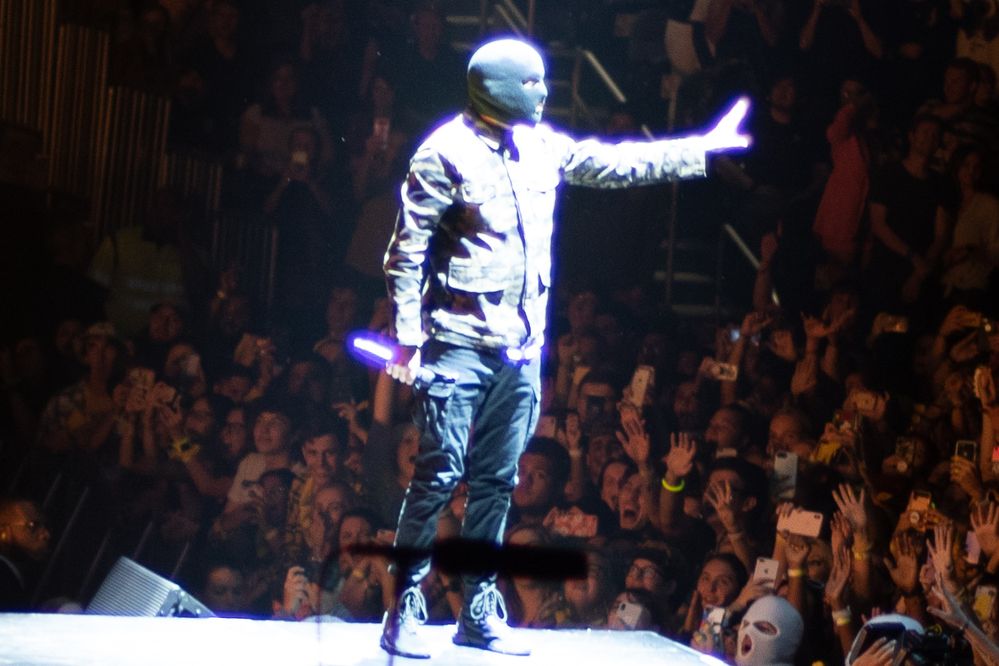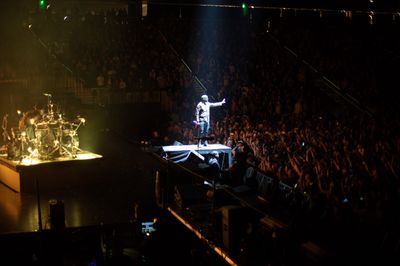- Canon Community
- Discussions & Help
- Camera
- EOS DSLR & Mirrorless Cameras
- Re: Concert photography help
- Subscribe to RSS Feed
- Mark Topic as New
- Mark Topic as Read
- Float this Topic for Current User
- Bookmark
- Subscribe
- Mute
- Printer Friendly Page
Concert photography help
- Mark as New
- Bookmark
- Subscribe
- Mute
- Subscribe to RSS Feed
- Permalink
- Report Inappropriate Content
10-14-2019 01:29 PM
Ive just recently gotten into concert photography and my first lens was a nifty fifty because Im usually up close. I brought my camera with me this weekend to try from far away, but ill let the picture explain itself. But what am I doing wrong or is it because I suck and maybe its just the lense. Ive cropped it also so you can see but this isn't the first time I've noticed this, because it usually happens when photographing a bright window. It turns a glowing purple and sometime pink/blue glaw also.The iso is 400, and i had only been going as high as 200, but I know theres more I should have done also.
- Mark as New
- Bookmark
- Subscribe
- Mute
- Subscribe to RSS Feed
- Permalink
- Report Inappropriate Content
10-14-2019 01:40 PM
Hello!
So that the Community can help you better, we will need to know exactly what camera and lens you're using. The community usually finds it helpful to know all of the EXIF information just so they can help you best.
Any other details you'd like to give will only help the Community better understand your issue!
If you're in the United States, and this is an urgent support need, please click HERE to enter your product information and discover your support options.
If you're outside of the USA, please click HERE to find support options in your country.
Thanks and have a great day!
- Mark as New
- Bookmark
- Subscribe
- Mute
- Subscribe to RSS Feed
- Permalink
- Report Inappropriate Content
10-14-2019 02:54 PM
- Mark as New
- Bookmark
- Subscribe
- Mute
- Subscribe to RSS Feed
- Permalink
- Report Inappropriate Content
10-14-2019 03:04 PM - edited 10-14-2019 03:05 PM
The condition is caused by overexposure of the brighter areas.
If you look at your uncropped image the single figure represents a very small percentage of the total picture area, but is also significantly brighter than the background.
If you look at the histogram posted below you have a portion up against the right hand side of the graph. That indicates a maxed out signal level.
You have too great a dynamic range (difference between dark areas and bright areas) for the camera to capture correctly.
If you post the camera you are using we can show you how to improve the image. (Edit - our postings crossed. Now I see what camera you have). More to follow.
Conway, NH
R6 Mark III, M200, Many lenses, Pixma PRO-100, Pixma TR8620a, Lr Classic
- Mark as New
- Bookmark
- Subscribe
- Mute
- Subscribe to RSS Feed
- Permalink
- Report Inappropriate Content
10-14-2019 03:07 PM
You have DR hat is beyond the ability of the camera. It is going to be difficult to capture exactly what your eye sees. I am guessing you are using the EOS R ? The lens I would use for this is the Canon RF 24-105mm f/4L IS USM Lens. Is this th elens you refer to as the 'kit' lens? Not any 50mm prime lens The 24-105mm f/4L is a very good lens.
EOS 1DX and many lenses.
- Mark as New
- Bookmark
- Subscribe
- Mute
- Subscribe to RSS Feed
- Permalink
- Report Inappropriate Content
10-14-2019 07:37 PM
@shellbo6901 wrote:Ive just recently gotten into concert photography and my first lens was a nifty fifty because Im usually up close. I brought my camera with me this weekend to try from far away, but ill let the picture explain itself. But what am I doing wrong or is it because I suck and maybe its just the lense. Ive cropped it also so you can see but this isn't the first time I've noticed this, because it usually happens when photographing a bright window. It turns a glowing purple and sometime pink/blue glaw also.The iso is 400, and i had only been going as high as 200, but I know theres more I should have done also.
In addition to the dynamic range and saturation issues, there is also quite a bit of purple fringing along the edges of dark and light.
"Enjoying photography since 1972."
- Mark as New
- Bookmark
- Subscribe
- Mute
- Subscribe to RSS Feed
- Permalink
- Report Inappropriate Content
10-14-2019 09:49 PM
- Mark as New
- Bookmark
- Subscribe
- Mute
- Subscribe to RSS Feed
- Permalink
- Report Inappropriate Content
10-15-2019 02:04 AM - edited 10-15-2019 02:19 AM
A couple of questions:
1. Is the stage itself quite brightly lit - I would assume that it is... and certainly compared to the rest of the venue.
2. What do you do with your images. e.g. do you post them on line rather than make big prints of them?
To explain - if you are serious about this as an acitivty:
It seems that bringing a big lens and camera is not acceptable, so adding reach to your FF camera is problematic
The subject SEEMS to be quite brightly lit, so if you can isolate the performers you should not have an issue with exposure
SO, my thought is that if you want to engage with all of these criteria and you don't intend to produce big prints, then you might want to consider getting a bridge camera, like the Powershot G3x.
It has field of view equivalent to 24-600mm, yet it is a very small and unobtrusive unit physically, so should not attract attention. It has a 1" sensor, so combined with the ability to zoom in and isolate your subject to reduce cropping and get a better dynamic range, the sensor is much bigger than the other super zooms like the SX70HS - that will be an advantage in challenging light conditions.
I have one and have found it to render superb results once you get used to it compared to a DSLR. Here is a link to the Reviews on DPReview Website and Review on Luminous Landscape
cheers, TREVOR
The mark of good photographer is less what they hold in their hand, it's more what they hold in their head;
"All the variety, all the charm, all the beauty of life is made up of light and shadow", Leo Tolstoy;
"Skill in photography is acquired by practice and not by purchase" Percy W. Harris
- Mark as New
- Bookmark
- Subscribe
- Mute
- Subscribe to RSS Feed
- Permalink
- Report Inappropriate Content
10-15-2019 02:08 AM
I can't do better than the answers given, but just to add one more confirmation vote that your picture does not seem to indicate a problem with the camera. I shoot gymnastics and the occasional indoor school event (stage and spotlights), and there is no way (that I know of) to get a spotlight shot and dark crowd both properly exposed in the same single photo.
One thing you could try for situations like the one you posted is to use single point AF with spot metering. That will meter your exposure for the specific subject you are shooting. the downside is it will likely clip many other parts of the image if you have one as wide as what you posted. E.g., if you exposed your cropped subject properly, odds are you would shadow clip most of the fans behind him.
- Mark as New
- Bookmark
- Subscribe
- Mute
- Subscribe to RSS Feed
- Permalink
- Report Inappropriate Content
10-15-2019 06:02 AM
Conway, NH
R6 Mark III, M200, Many lenses, Pixma PRO-100, Pixma TR8620a, Lr Classic
01/20/2026: New firmware updates are available.
12/22/2025: New firmware update is available for EOS R6 Mark III- Version 1.0.2
11/20/2025: New firmware updates are available.
EOS R5 Mark II - Version 1.2.0
PowerShot G7 X Mark III - Version 1.4.0
PowerShot SX740 HS - Version 1.0.2
10/21/2025: Service Notice: To Users of the Compact Digital Camera PowerShot V1
10/15/2025: New firmware updates are available.
Speedlite EL-5 - Version 1.2.0
Speedlite EL-1 - Version 1.1.0
Speedlite Transmitter ST-E10 - Version 1.2.0
07/28/2025: Notice of Free Repair Service for the Mirrorless Camera EOS R50 (Black)
7/17/2025: New firmware updates are available.
05/21/2025: New firmware update available for EOS C500 Mark II - Version 1.1.5.1
02/20/2025: New firmware updates are available.
RF70-200mm F2.8 L IS USM Z - Version 1.0.6
RF24-105mm F2.8 L IS USM Z - Version 1.0.9
RF100-300mm F2.8 L IS USM - Version 1.0.8
- Question about calibrating AFMA on 7dmkii with sigma 150-600mm cont. in EOS DSLR & Mirrorless Cameras
- Macro Twin Lite MT-26EX-RT spare attachment ring needed in Camera Accessories
- EOS R6 Mark III How to turn off LCD/EVF for night photography/time-lapse in EOS DSLR & Mirrorless Cameras
- EOS R7 unable to connect to Android Galaxy S22 in EOS DSLR & Mirrorless Cameras
- EOS R6 Mark II - Stick with LP-E6NH or switch to LP- E6P Batteries? in Camera Accessories
Canon U.S.A Inc. All Rights Reserved. Reproduction in whole or part without permission is prohibited.




